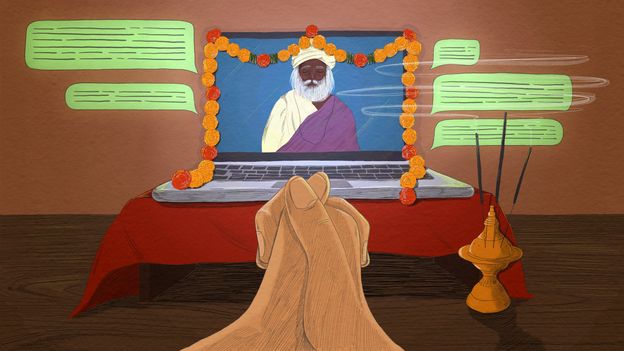Religious chatbots might be trained on scripture and dutifully quote verses, but they share the same bizarre hallucinations and shortcomings of other AIs
But the specifics of Hindu worship make it an especially interesting case study. In a tradition where the sacred regularly takes a physical, tangible form, technology can become another vessel through which the gods appear in daily life, Walters and others say. One example are “murtis“, sacred statues and images of deities believed to house divine energies and often understood to embody the gods themselves. These items are often central to religious rituals, including “puja” – offerings of mantras (chants) accompanied by food, flowers, incense and light which can be presented to murtis – and “darshan” – the act of seeing and being seen by divine objects and people.
“What shows up in the news, robotic Krishnas or chatbots, is often treated as a cute novelty. But it’s far beyond novelty at this point,” Walters says.
When ChatGPT and generative AI boomed, a number of entrepreneurs, devotees and technology enthusiasts were inspired to build chatbots that would put you in direct contact with the teachings of various Hindu deities – including multiple AIs all called GitaGPT. Vikas Sahu, a business student from Rajasthan, India, developed his GitaGPT as a side project. He expected a slow start, but Sahu says the service gained a whopping 100,000 users in just a few days. Since then, the work has expanded to create chatbots based on other Hindu scriptures for AI versions of other gods. Sahu says he hopes to “morph it into an avenue to the teachings of all [Hindu] gods and goddesses”. He says he dropped out of his MBA midway to pursue funding for the project.
Tanmay Shresth, a 23-year-old from New Delhi, India, who works in IT, uses yet another chatbot based on the Bhagavad Gita, which claims to put users in direct contact with Krishna. Shresth says the AI offers something steady in a world that’s changing at a breakneck pace. “At times, it’s hard to find someone to talk to about religious or existential subjects,” Shresth says. “AI is non-judgmental, accessible and yields thoughtful responses.”

